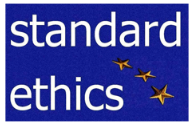What the agency does
Standard Ethics follows the Applicant-Pay Model issuing solicited, non-financial ratings to entities who want to be evaluated. Standard Ethics does not advise investors and does not provide consultancy to its customers.
Standard Ethics assigns Standard Ethics Ratings (SER) © to:
- Companies
- Sovereign issuers
- Securities
The Standard Ethics Rating, which has been tested since 2002 is:
- Solicited, because it is issued only on request by an applicant, the recipient of the rating.
- Standard, because any rating is always comparable to others since the algorithms are aligned to the same guidelines. For this reason, clients or other third parties cannot change the agency's principles of evaluation or change the procedures for issuing ratings.
- Independent, because its assignment is incompatible with the supply of other services, research and consulting activities related to the data collected. Furthermore, no common financial and economic interests exist between the rating agency and the applicant.

In short, the Standard Ethics Rating is a rating that intends to deliver an opinion on the level of compliance of companies and sovereign nations in the field of Sustainability and corporate governance based on documents and guidelines published by:
- the United Nations (UN);
- the Organisation for Economic Cooperation and Development (OECD);
- the European Union (EU).
The agency's role is to help companies and organisations talk a common language with stakeholders and investors.
For details on Standard Ethics rating methodology, please visit the dedicated website Standard Ethics Rating.
And, how is this done?
Standard Ethics scheme comprises an analyst-driven rating process lasting six-eight weeks (on average) based on Guidelines composed of 225 analysis points. To ensure accuracy and comparability of the final evaluation, Standard Ethics uses a proprietary six-variable algorithm.
The work to be carried out does not require applicants to fill out forms and questionnaires or draft other documentation in addition to existing information. Standard Ethics analysts will gather the required data through standard procedures and common guidelines.
Impartiality
Standard Ethics has a governance model that has been designed to: a) suit a modern ratings agency; b) avoid conflicts of interest; c) be in line with recent European Parliament requirements; and d) ensure incompatibility between ratings and other economic activities.
Its structure is supervised by a Compliance Officer. Data collection and quotations for assigning Standard Ethics Ratings are supervised by its Rating Committee.


